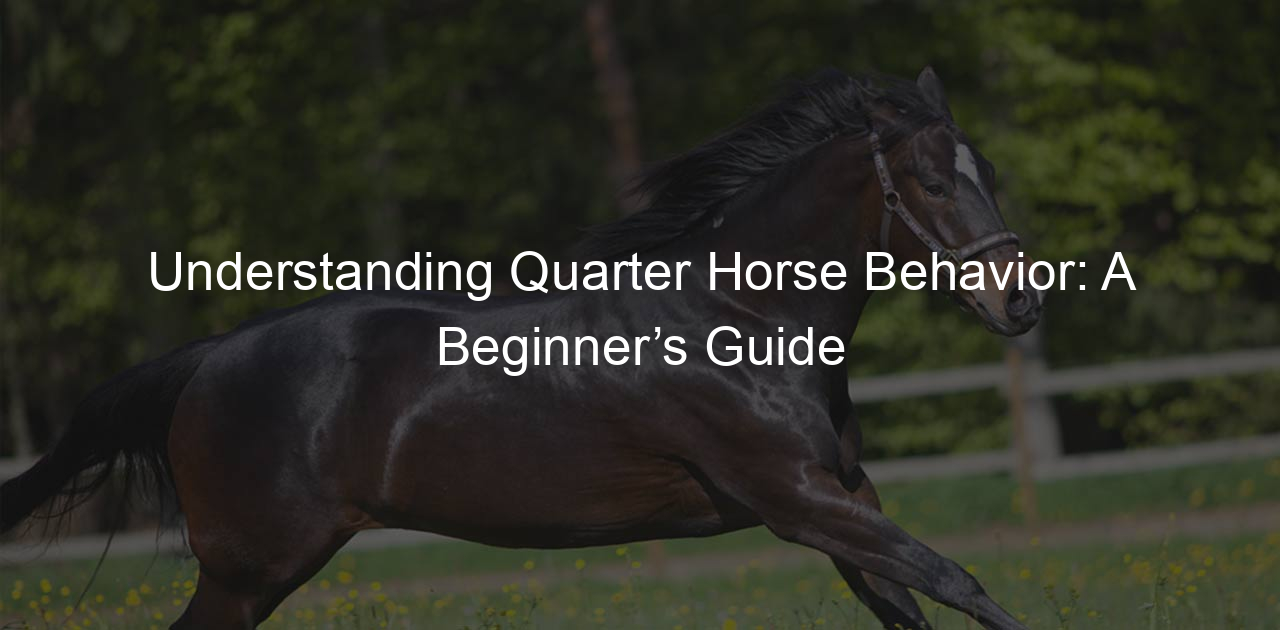
Introduction: The Importance of Mental Stimulation for Rescued Quarter Horses
Rescued Quarter Horses need special care to thrive. One key aspect of their care is mental stimulation. Let’s explore why this is so important.
- Understanding the Quarter Horse Breed: Quarter Horses are known for their agility and speed. They are often used in racing, rodeos, and as working ranch horses. Their intelligence and energy make them unique.
- The Importance of Mental Health in Horses: Just like humans, horses need mental stimulation to stay happy and healthy. Without it, they can become bored, anxious, or even depressed.
- Why Rescued Horses Need Special Care: Rescued horses often come from difficult situations. They may have faced neglect or abuse. Providing them with mental stimulation helps them recover and adjust to their new lives.
Understanding the Mental Health of Quarter Horses
Quarter Horse Mental Health: An Overview
- Common mental health issues in quarter horses:
Quarter horses, like all animals, can suffer from mental health problems. Some common issues include anxiety, depression, and stress. These can be caused by various factors such as changes in environment, lack of social interaction, or past trauma.
| Mental Health Issue | Possible Causes |
|---|---|
| Anxiety | Separation from herd, new surroundings |
| Depression | Isolation, lack of mental stimulation |
| Stress | Overworking, poor living conditions |
- Signs of mental distress in quarter horses:
Recognizing signs of mental distress in quarter horses is crucial for their well-being. Some signs to watch for include:
- Changes in behavior: A normally calm horse may become aggressive or anxious.
- Loss of appetite: A horse that stops eating may be experiencing stress or depression.
- Isolation: Horses that isolate themselves from the herd may be feeling anxious or depressed.
- Repetitive behaviors: Actions like pacing or cribbing can indicate stress or boredom.
It’s important to monitor your horse’s behavior and consult with a veterinarian if you notice any of these signs.
Effects of Neglect on Rescued Quarter Horses
- Physical effects of neglect
Neglect can cause serious physical problems for Quarter Horses. They may suffer from malnutrition, leading to weak muscles and bones. Poor grooming can result in skin infections and parasites. Lack of hoof care can cause painful conditions like laminitis.
| Physical Issue | Cause | Effect |
|---|---|---|
| Malnutrition | Insufficient food | Weak muscles and bones |
| Skin infections | Poor grooming | Itching, sores |
| Laminitis | Lack of hoof care | Painful hooves |
- Mental effects of neglect
Neglect also affects a horse’s mind. They can become anxious or depressed. Horses are social animals and need interaction. Without it, they may develop behavioral issues like cribbing or weaving.
According to Wikipedia, neglected animals often show signs of mental distress. This is true for horses too. They may become fearful or aggressive.
Benefits of Mental Stimulation for Horses
Improving Horse Mental Well-being
- How mental stimulation contributes to overall health
Mental stimulation is crucial for a horse’s overall health. Just like humans, horses need activities that challenge their minds. These activities can reduce stress, prevent boredom, and improve their mood. A mentally stimulated horse is more likely to be happy and healthy.
Studies show that horses with regular mental activities have lower levels of stress hormones. This means they are less likely to develop health problems related to stress, such as ulcers or colic. Mental stimulation also helps in socialization, making horses more friendly and easier to handle.
- Case study: The transformation of a rescued quarter horse with mental stimulation
Meet Bella, a rescued quarter horse who was once anxious and withdrawn. Bella’s new owners introduced her to various mental stimulation activities, such as puzzle feeders and interactive toys. Over time, Bella’s behavior changed dramatically.
Before mental stimulation, Bella often seemed nervous and would pace around her stall. After a few weeks of engaging activities, Bella became more relaxed and curious. She started to enjoy her time with people and other horses.
This transformation shows how powerful mental stimulation can be. Bella’s story is a testament to the importance of keeping a horse’s mind active. It not only improves their mental well-being but also their overall quality of life.
Mental Enrichment for Horses: Techniques and Benefits
- Various techniques for mental enrichment
There are many ways to keep a horse’s mind active. Here are some popular techniques:
-
- Interactive Toys: Toys like balls and puzzles can engage a horse’s mind.
- Obstacle Courses: Setting up simple courses with cones and poles can challenge their thinking.
- Training Sessions: Regular training with new commands and tricks keeps them sharp.
- Social Interaction: Spending time with other horses or humans helps them stay mentally fit.
- Environmental Changes: Changing their surroundings or adding new objects can stimulate curiosity.
- Benefits of each technique
Each technique offers unique benefits:
-
- Interactive Toys: These toys can reduce boredom and prevent destructive behavior.
- Obstacle Courses: They improve problem-solving skills and physical coordination.
- Training Sessions: Training builds trust and strengthens the bond between horse and owner.
- Social Interaction: Interaction reduces stress and promotes emotional well-being.
- Environmental Changes: New environments keep horses curious and engaged, reducing anxiety.
Rescued Quarter Horse Care: Mental Stimulation Techniques
Horse Rehabilitation Techniques: Mental Exercises
Rescued horses need mental exercises to stay happy and healthy. Here are some examples:
- Puzzle Feeders: These feeders make horses work to get their food. It keeps their minds busy.
- Obstacle Courses: Set up simple obstacles for your horse to navigate. It can be as easy as stepping over poles.
- Clicker Training: Use a clicker to teach your horse new tricks. It’s fun and rewarding for them.
- Interactive Toys: Toys like balls or cones can keep your horse entertained and mentally active.
How to Implement These Exercises in Daily Routine
Adding mental exercises to your horse’s daily routine is easy. Here’s how:
- Start Slow: Begin with simple tasks and gradually increase the difficulty. This helps your horse build confidence.
- Consistency: Make sure to include mental exercises in your horse’s routine every day. Consistency is key.
- Positive Reinforcement: Always reward your horse for completing tasks. Treats or praise work well.
- Mix It Up: Change the exercises regularly to keep things interesting for your horse.
Rescued Horse Behavior Improvement: Training Tips
- Training Tips for Rescued Quarter Horses:
Training rescued quarter horses can be a rewarding experience. Here are some tips to help you get started:
-
- Start Slow: Begin with basic commands like “walk” and “stop.” Gradually introduce more complex tasks.
- Use Positive Reinforcement: Reward your horse with treats or praise when they follow commands. This builds trust.
- Be Consistent: Consistency is key. Train at the same time each day to create a routine.
- Patience is Crucial: Remember, rescued horses may have had traumatic experiences. Be patient and gentle.
- How Training Contributes to Mental Stimulation:
Training isn’t just about teaching commands; it also stimulates your horse’s mind. Here’s how:
-
- Engages the Brain: Learning new tasks keeps your horse’s brain active and engaged.
- Builds Confidence: Successfully completing tasks boosts your horse’s confidence and reduces anxiety.
- Strengthens Bond: Training sessions strengthen the bond between you and your horse, creating a sense of security.
- Reduces Boredom: Regular training keeps your horse from getting bored, which can lead to destructive behavior.
Conclusion: The Role of Mental Stimulation in Rescued Quarter Horse Care
Mental stimulation is crucial for the well-being of rescued Quarter Horses. It helps them recover from trauma, reduces stress, and improves their overall health. Engaging their minds can lead to better behavior and a happier life.
- Key takeaways for horse owners:
- Provide a variety of activities to keep your horse engaged.
- Use toys, puzzles, and training exercises to stimulate their minds.
- Regular interaction and socialization are essential.
- Monitor your horse’s behavior and adjust activities as needed.
- Consult with a vet or equine behaviorist for personalized advice.
| Key Insight | Details |
|---|---|
| Importance of Mental Stimulation | Helps in recovery, reduces stress, and improves overall health. |
| Variety of Activities | Include toys, puzzles, and training exercises. |
| Regular Interaction | Essential for mental well-being and socialization. |
| Behavior Monitoring | Adjust activities based on your horse’s needs. |
| Professional Advice | Consult with a vet or equine behaviorist for guidance. |
By understanding and implementing mental stimulation techniques, horse owners can significantly improve the lives of their rescued Quarter Horses. Happy horses are healthy horses, and mental engagement is a key part of their care.









